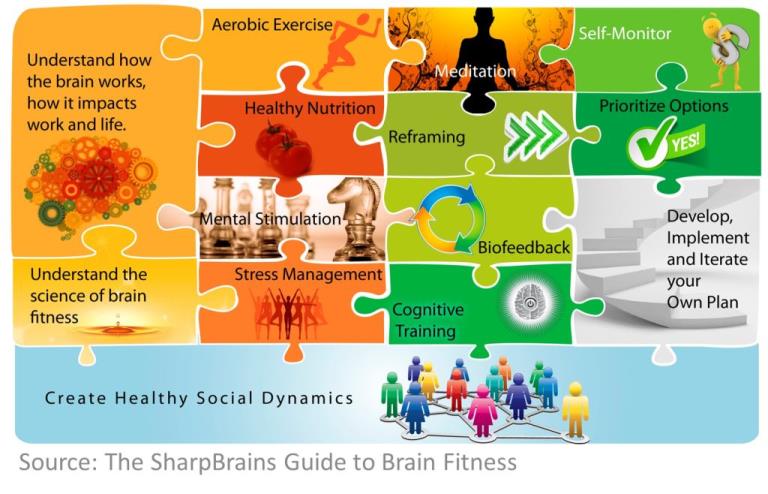Source: http://brainblogger.com/2016/04/19/does-your-brain-work-differently-depending-on-the-seasons/
The brain is the body’s the most mysterious organ. It functions in ways that experts are still trying to figure out. As much as we know about this organ, there are still various things left to discover and learn. For instance, did you know that the brain functions differently in winter than it does in summertime?
Brain function and the seasons
The conclusion that the brain works differently in winter than it does in summer came as a result of a study conducted by Gilles Vandewalle and Christelle Meyer of the University of Liege in Belgium. The researchers who worked on the study inspected the cognitive brain functions of 28 Belgians during each season of the year.
During each season, participants spent about 4.5 hours in the lab where they didn’t have access to the external world or seasonal cues such as daylight. For the purpose of t…
Source: http://brainblogger.com/2016/04/19/does-your-brain-work-differently-depending-on-the-seasons/
The brain is the body’s the most mysterious organ. It functions in ways that experts are still trying to figure out. As much as we know about this organ, there are still various things left to discover and learn. For instance, did you know that the brain functions differently in winter than it does in summertime?
Brain function and the seasons
The conclusion that the brain works differently in winter than it does in summer came as a result of a study conducted by Gilles Vandewalle and Christelle Meyer of the University of Liege in Belgium. The researchers who worked on the study inspected the cognitive brain functions of 28 Belgians during each season of the year.
During each season, participants spent about 4.5 hours in the lab where they didn’t have access to the external world or seasonal cues such as daylight. For the purpose of t…
Source: http://www.nia.nih.gov/research/blog/2015/08/special-budget-alzheimers-and-related-dementias
Just last week, I had the honor of presenting, on behalf of NIH Director Dr. Francis Collins, the first-ever NIH Professional Judgment Budget for Alzheimer’s disease and related dementias. Outlined at the July 27 meeting of the HHS Secretary’s Advisory Council on Alzheimer’s Research, Care, and Services, the proposal—commonly referred to as a Bypass Budget—lays out NIH’s plan to speed discovery into these devastating disorders, aimed at meeting the research goal of the National Plan to Address Alzheimer’s Disease—to prevent and effectively treat Alzheimer’s disease by 2025….
Source: http://www.nia.nih.gov/research/blog/2015/08/special-budget-alzheimers-and-related-dementias
Just last week, I had the honor of presenting, on behalf of NIH Director Dr. Francis Collins, the first-ever NIH Professional Judgment Budget for Alzheimer’s disease and related dementias. Outlined at the July 27 meeting of the HHS Secretary’s Advisory Council on Alzheimer’s Research, Care, and Services, the proposal—commonly referred to as a Bypass Budget—lays out NIH’s plan to speed discovery into these devastating disorders, aimed at meeting the research goal of the National Plan to Address Alzheimer’s Disease—to prevent and effectively treat Alzheimer’s disease by 2025….
Source: http://www.brainhealtheducation.org/recovery-from-mild-tbi-in-previously-healthy-adults/?utm_source=rss&utm_medium=rss&utm_campaign=recovery-from-mild-tbi-in-previously-healthy-adults
This Journal of Neurotrauma prospective longitudinal study reports recovery from mild traumatic brain injury (MTBI) across multiple domains in a carefully selected consecutive sample of 74 previously healthy adults. The patients with MTBI and 40 orthopedic controls (i.e., ankle injuries) completed assessments at 1, 6, and 12 months after injury. Outcome measures included cognition, post-concussion
Read More…
…
Source: http://www.brainhealtheducation.org/recovery-from-mild-tbi-in-previously-healthy-adults/?utm_source=rss&utm_medium=rss&utm_campaign=recovery-from-mild-tbi-in-previously-healthy-adults
This Journal of Neurotrauma prospective longitudinal study reports recovery from mild traumatic brain injury (MTBI) across multiple domains in a carefully selected consecutive sample of 74 previously healthy adults. The patients with MTBI and 40 orthopedic controls (i.e., ankle injuries) completed assessments at 1, 6, and 12 months after injury. Outcome measures included cognition, post-concussion
Read More…
…
Source: http://sharpbrains.com/blog/2016/04/18/10-common-brain-health-myths-debunked/

— Andrew Rich via Getty Images
10 Common Brain Health and Brain Training Myths, Debunked (The Huffington Post):
“Given all the interest in—and confusion around—-the topics of brain training, neuroplasticity and brain health, let’s debunk ten myths that remain surprisingly popular…Keep reading article at The Huffington Post.
…
Source: http://sharpbrains.com/blog/2016/04/18/10-common-brain-health-myths-debunked/

— Andrew Rich via Getty Images
10 Common Brain Health and Brain Training Myths, Debunked (The Huffington Post):
“Given all the interest in—and confusion around—-the topics of brain training, neuroplasticity and brain health, let’s debunk ten myths that remain surprisingly popular…Keep reading article at The Huffington Post.
…
Source: http://brainblogger.com/2016/04/17/best-and-worst-in-health-and-healthcare-march-2016/
The best news from March is that spring has sprung in the northern hemisphere! Spring is a great time to go outside and get active, which, as March showed us yet again, will only do you good.
Health and healthcare research also brought us good news in the form of new diagnostic tools and new therapies. But as always, there are also bad news. Here’s a selection of the best and worst news I came across in March. Comments are welcome!
THE BEST
Aging delayed by exercise
Exercise can greatly benefit our brain’s health by delaying the onset of cognitive decline. In a report published in Neurology in March, it was shown just how powerful exercise can be. The effect of leisure-time physical activity in cognitive performance was determined and it was shown that cognitively decline was significantly less accentuated in physically active subjects. Low levels of <a href="http://brainblogger.com/2014/10/24/exercise-reduce…
Source: http://brainblogger.com/2016/04/17/best-and-worst-in-health-and-healthcare-march-2016/
The best news from March is that spring has sprung in the northern hemisphere! Spring is a great time to go outside and get active, which, as March showed us yet again, will only do you good.
Health and healthcare research also brought us good news in the form of new diagnostic tools and new therapies. But as always, there are also bad news. Here’s a selection of the best and worst news I came across in March. Comments are welcome!
THE BEST
Aging delayed by exercise
Exercise can greatly benefit our brain’s health by delaying the onset of cognitive decline. In a report published in Neurology in March, it was shown just how powerful exercise can be. The effect of leisure-time physical activity in cognitive performance was determined and it was shown that cognitively decline was significantly less accentuated in physically active subjects. Low levels of <a href="http://brainblogger.com/2014/10/24/exercise-reduce…
Source: http://www.brainhealtheducation.org/studying-football-fish-oil-and-head-trauma-at-tcu/?utm_source=rss&utm_medium=rss&utm_campaign=studying-football-fish-oil-and-head-trauma-at-tcu
A new study published in the journal Medicine & Science in Sports & Exercise conducted during the 2014 football season at Texas Christian University shows fish oil could help reduce the brain-damaging effects of head trauma. In the double-blind study of 81 football players, more than 60 started taking DHA at the beginning of the summer of
Read More…
…
Source: http://www.brainhealtheducation.org/studying-football-fish-oil-and-head-trauma-at-tcu/?utm_source=rss&utm_medium=rss&utm_campaign=studying-football-fish-oil-and-head-trauma-at-tcu
A new study published in the journal Medicine & Science in Sports & Exercise conducted during the 2014 football season at Texas Christian University shows fish oil could help reduce the brain-damaging effects of head trauma. In the double-blind study of 81 football players, more than 60 started taking DHA at the beginning of the summer of
Read More…
…
Source: http://womensbrainhealth.org/think-it-over/white-matter-hyperintensities-may-be-linked-to-alzheimers-onset
by Neurology Advisor: Autosomal dominant Alzheimer’s disease is associated with increased white matter hyperintensities (WMH) on magnetic resonance imaging well before expected symptom onset, according to a study published in the Annals of Neurology. Seonjoo Lee, PhD, from Columbia University……
Source: http://womensbrainhealth.org/think-it-over/white-matter-hyperintensities-may-be-linked-to-alzheimers-onset
by Neurology Advisor: Autosomal dominant Alzheimer’s disease is associated with increased white matter hyperintensities (WMH) on magnetic resonance imaging well before expected symptom onset, according to a study published in the Annals of Neurology. Seonjoo Lee, PhD, from Columbia University……
Source: http://sharpbrains.com/blog/2016/04/06/april-21st-virtual-lecture-to-discuss-25-must-know-facts-about-brain-health-neuroplasticity-and-technology/
 Dear SharpBrains friend,
Dear SharpBrains friend,
As Dr. Robert Bilder, Tan Le and myself finalize the curriculum for the upcoming virtual lecture on April 21st, we are working hard to select the key brain-related facts that everyone should truly understand in order to navigate the growing stream of news articles, research reports and marketing claims. Focusing on 25 fundamental facts (instead of the 50 initially envisioned) will enable us to discuss each in more depth, empowering participants with more clear and solid take-aways.
With those 25 Must-Know Facts we will zoom into the most significant (and often overlooked) areas in the <str…
Source: http://sharpbrains.com/blog/2016/04/06/april-21st-virtual-lecture-to-discuss-25-must-know-facts-about-brain-health-neuroplasticity-and-technology/
 Dear SharpBrains friend,
Dear SharpBrains friend,
As Dr. Robert Bilder, Tan Le and myself finalize the curriculum for the upcoming virtual lecture on April 21st, we are working hard to select the key brain-related facts that everyone should truly understand in order to navigate the growing stream of news articles, research reports and marketing claims. Focusing on 25 fundamental facts (instead of the 50 initially envisioned) will enable us to discuss each in more depth, empowering participants with more clear and solid take-aways.
With those 25 Must-Know Facts we will zoom into the most significant (and often overlooked) areas in the <str…


 Dear SharpBrains friend,
Dear SharpBrains friend,